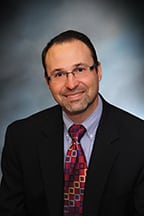Heart Rhythm – The Loop Recorder
 By Brian H. Sarter, M.D., F.A.C.C., F.H.R.S.
By Brian H. Sarter, M.D., F.A.C.C., F.H.R.S.
Patients who have heart rhythm abnormalities can be difficult to diagnose. Very often these patients have symptoms that are sporadic and unpredictable. Abnormality of the heart rhythm can lead to symptoms of palpitations, racing heart rates, light-headedness, chest pain, shortness of breath and fainting spells. Furthermore, some heart rhythm disturbances such as atrial fibrillation may not cause any symptoms but can lead to stroke. Since management and treatment of these heart rhythm abnormalities varies depending on the mechanism, an electrical recording of the abnormality at the time they occur is critical. Various wearable monitors provide an opportunity to capture these heart rhythm abnormalities but generally these monitors can be worn only up to three weeks. Very often symptoms may not occur during the monitored period or the monitored period may be too short to definitively rule out a significant heart rhythm abnormality.
Recognizing that more prolonged periods of monitoring are necessary, the implantable loop recorder was developed. These devices can monitor a patient’s heart rhythm for up to three years. They continuously record the patient’s heart rhythm and if an abnormality is detected, it is stored within the device. The device can then wirelessly communicate with a web-based monitoring system to be reviewed by the cardiologist. Many studies over the past 10 years have confirmed the utility of these devices to improve heart rhythm abnormality detection leading to improved management of these patients.
The implantable loop recorder is a small device (about the size of clip on a pen) that is inserted under the skin in the chest. The procedure is usually performed in the doctor’s office under local anesthetic and takes about 5-10 minutes to perform. There is minimal risk of the procedure, the device has no wires or patches, and there is no concern about getting the device wet during bathing or swimming. These devices are generally safe for use for patients who require MRI imaging.
Patients who should be considered for an implantable loop recorder are generally those referred to a cardiologist in whom a heart rhythm abnormality is suspected but remains undiagnosed despite standard testing. The two most common indications are for patients with recurrent episodes of fainting of unclear cause and those with strokes that are felt to be related to atrial fibrillation. The use of implantable loop recorders has undoubtedly benefited many patients over the past 10 years.
Bio
Dr. Brian H. Sarter has been a member of Cardiology Physicians since April 1998. Dr. Sarter attended Duke University where he graduated Summa Cum Laude with his Bachelor’s Degree in Science. He attended the New York University School of Medicine where he was elected to Alpha Omega Alpha (Medical Honor Society). He completed his Internal Medicine training at the Hospital of the University of Pennsylvania. He continued at the Hospital of the University of Pennsylvania to complete two years of his Cardiology fellowship and did additional training in the subspecialty of Electrophysiology at Hahnemann University Hospital and Medical College of Pennsylvania. Dr. Sarter has authored or co-authored over 30 papers in the field of Electrophysiology which have been published in major Cardiology Journals. He is a Fellow of the Heart Rhythm Society and American College of Cardiology and a member of the Delaware Medical Society.
Dr. Sarter has a strong commitment to clinical and consultative Cardiology and his added expertise in Electrophysiology allows our Practice to service the needs of patients with cardiac rhythm disturbances. Dr. Sarter has extensive experience in both medical and interventional treatment of cardiac arrhythmias. He is highly proficient in defibrillator implantation, pacemaker therapy, and radiofrequency ablation of both ventricular and atrial dysrhythmias. He is the first physician in the community to have implanted biventricular pacing devices for the treatment of chronic refractory congestive heart failure and the first physician in the community to offer curative catheter ablation for atrial fibrillation. Dr. Sarter is the Medical Director of the Heart and Vascular Interventional Services and the Associate Chief of Cardiology at ChristianaCare Hospital in Newark, Delaware.
Dr. Sarter and his wife Eileen were married in 1991 and have two children, Jake and Darian. Dr. Sarter enjoys spending time with his family as well as jogging, golfing, skiing and exercise.
Cardiogoly Physicians P.A.
Abby Medical Center 302-366-8600 One Centurian Drive, Suite 200 Newark, DE 19713
Foulk & Wilson Professional Center 910 Foulk Road Wilmington DE 19803
For diagnostic scheduling please call 99 Heart (43278)
Follow @cardiocppa on facebook


